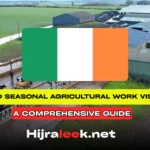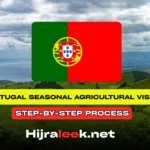The opportunity to work in Italy’s lush farmlands is a dream for many, combining the chance to earn a stable income with the experience of living in one of Europe’s most picturesque countries. Seasonal Farm Jobs Italy 2025 are made possible through the Italian government’s Decreto Flussi, a program that regulates the entry of non-EU workers to meet the country’s labor demands in agriculture and other sectors. This comprehensive guide will walk you through the process of applying for seasonal agricultural work in Italy for 2025, covering eligibility, application steps, benefits, challenges, and frequently asked questions to help you secure a job and thrive in Italy’s agricultural sector.
What Are Seasonal Farm Jobs in Italy?
Seasonal farm jobs in Italy involve temporary employment in the agricultural sector, typically lasting up to nine months. These jobs include tasks such as planting, harvesting, pruning, and processing crops like olives, grapes, tomatoes, citrus fruits, and vegetables. Italy’s agricultural industry is a vital part of its economy, renowned for producing world-class products such as olive oil, wine, and fresh produce. Regions like Tuscany, Puglia, Sicily, and Veneto are particularly known for their high demand for seasonal workers during peak harvesting seasons.
The Decreto Flussi 2025 is the key mechanism that facilitates these opportunities for non-EU workers. This annual immigration quota system allocates a specific number of work visas for seasonal employment, allowing workers from eligible countries to legally work in Italy. For those seeking job opportunities, platforms like Hijraleek offer a reliable way to connect with verified Italian employers in the agricultural sector.
Why Choose Seasonal Farm Jobs in Italy?
Working as a seasonal farm worker in Italy offers numerous benefits, including:
- Competitive Wages: Farm workers typically earn €8–€12 per hour, with some employers providing accommodation and meals, reducing living costs.
- Cultural Immersion: Live and work in Italy’s scenic countryside, experiencing its rich history, cuisine, and traditions.
- Skill Development: Gain hands-on experience in agriculture, which can enhance your resume and open doors to future opportunities.
- Legal Employment: The Decreto Flussi ensures workers have legal protections, fair wages, and safe working conditions.
- Networking: Seasonal work can lead to connections with employers, potentially paving the way for longer-term opportunities.
For more information on Italy’s agricultural sector, visit the Italian Ministry of Agriculture.
Eligibility for Seasonal Farm Jobs Italy 2025
To apply for Seasonal Farm Jobs Italy 2025, candidates must meet specific eligibility criteria outlined by the Italian government. These requirements ensure that only qualified individuals are granted work permits. Key eligibility criteria include:
- Non-EU Citizenship: The program is designed for nationals of non-European Union countries with bilateral agreements with Italy, such as Morocco, Tunisia, India, Pakistan, and others. The full list of eligible countries is published with the Decreto Flussi announcement.
- Job Offer: A valid job offer or contract from an Italian employer in the agricultural sector is mandatory.
- Age Requirement: Applicants must be at least 18 years old.
- Valid Passport: A passport valid for at least six months beyond the intended stay in Italy is required.
- Health and Background Checks: Some embassies may require proof of good health and a clean criminal record.
- Financial Stability: While not always required, some applicants may need to show proof of sufficient funds to support themselves, though this is often covered by the job contract.
To confirm your country’s eligibility, check the Italian Ministry of the Interior for updates on bilateral agreements.
Step-by-Step Guide to Applying for Seasonal Farm Jobs
The application process for seasonal farm jobs in Italy involves coordination between the worker, the employer, and Italian authorities. Below is a detailed guide to help you navigate the process:
- Find a Job Offer: Start by securing a job offer from an Italian employer. Platforms like Hijraleek connect workers with verified employers in Italy’s agricultural sector. You can also contact farms directly in regions like Tuscany or Sicily or work with recruitment agencies specializing in seasonal work.
- Employer Requests Nulla Osta: The employer must apply for a work permit, known as the Nulla Osta, through the Italian government’s online portal during the Decreto Flussi application window. This permit authorizes the employer to hire a non-EU worker.
- Wait for Nulla Osta Approval: The Italian authorities review the Nulla Osta application, typically within 30–60 days. If approved, the employer receives the permit, which is then sent to the worker.
- Apply for the Work Visa: With the approved Nulla Osta, apply for a seasonal work visa at the Italian embassy or consulate in your home country. Required documents include:
- Valid passport
- Approved Nulla Osta
- Signed job contract
- Proof of accommodation (often provided by the employer)
- Health insurance covering the duration of your stay
- Completed visa application form
- Recent passport-sized photographs
- Attend an Interview (if required): Some embassies may request an interview to verify your application details and intentions.
- Receive the Visa: If approved, the visa is issued, typically within a few weeks. You can then travel to Italy to begin your employment.
- Register in Italy: Upon arrival, you must register with local authorities within eight days to obtain a residence permit (Permesso di Soggiorno).
For visa application support, VFS Global provides services for Italian visa processing in many countries.
Key Dates and Quotas for 2025
The Decreto Flussi 2025 is expected to announce visa quotas in late 2024 or early 2025, with applications typically opening in February or March. In recent years, Italy has allocated 30,000–40,000 seasonal work visas annually, with a significant portion reserved for agriculture due to its economic importance. The exact quota for 2025 will be confirmed closer to the application period.
To stay updated, regularly check the Italian Government Portal or subscribe to updates from platforms like Hijraleek.
Tips for Securing Seasonal Farm Jobs
To increase your chances of success, consider the following tips:
- Apply Early: Visa quotas are limited and filled on a first-come, first-served basis. Submit your application as soon as the Decreto Flussi portal opens.
- Use Trusted Platforms: Work with reputable platforms like Hijraleek to find legitimate job opportunities and avoid scams.
- Prepare Documents in Advance: Gather all required documents, such as your passport, job contract, and health insurance, before the application window.
- Learn Basic Italian: While not mandatory, basic Italian language skills can improve communication with employers and enhance your integration.
- Verify Employer Credibility: Ensure the employer is registered with Italian authorities and has a history of hiring seasonal workers.
- Network Locally: Connect with agricultural associations or local communities in Italy to learn about job openings and employer expectations.
Challenges and Solutions
Applying for seasonal farm jobs in Italy can present challenges, but with preparation, these can be overcome:
- Limited Quotas: The high demand for visas means quotas fill quickly. Apply early and monitor official announcements to stay ahead.
- Complex Paperwork: The documentation process can be overwhelming. Double-check all documents for accuracy and seek assistance from platforms like Hijraleek if needed.
- Language Barriers: Communication with employers or authorities may be difficult without Italian skills. Use translation apps or take basic Italian lessons to bridge the gap.
- Processing Delays: Embassy processing times can vary. Apply early and follow up with the consulate to track your application status.
Benefits of Working in Italy’s Agricultural Sector
Seasonal farm jobs in Italy offer more than just financial rewards. Workers gain:
- Cultural Experience: Live in Italy’s countryside, exploring its history, cuisine, and festivals.
- Skill Enhancement: Learn agricultural techniques that can be applied in future roles.
- Legal Protections: The Decreto Flussi ensures fair wages and safe working conditions under Italian labor laws.
- Potential for Future Opportunities: Successful seasonal work can lead to employer recommendations or other visa categories.
Italy Farm Work Visa 2025: Decreto Flussi Explained
Frequently Asked Questions (FAQs)
1. What are seasonal farm jobs in Italy?
Seasonal farm jobs involve temporary agricultural work, such as harvesting crops like olives, grapes, or tomatoes, typically lasting up to nine months under the Decreto Flussi program.
2. Who can apply for seasonal farm jobs in Italy 2025?
Non-EU nationals from countries with bilateral agreements with Italy, aged 18 or older, with a valid job offer and passport, are eligible.
3. How do I find a farm job in Italy?
Use platforms like Hijraleek to connect with verified employers, or contact farms directly in regions like Tuscany or Puglia.
4. What documents are needed for the visa application?
You’ll need a valid passport, approved Nulla Osta, job contract, proof of accommodation, health insurance, and a completed visa application form.
5. How long can I stay in Italy with a seasonal work visa?
The visa allows a stay of up to nine months, aligned with the duration of your work contract.
6. Can I extend my seasonal work visa?
Extensions are possible in some cases, depending on employer needs and Italian immigration regulations.
7. How much can I earn as a seasonal farm worker?
Wages typically range from €8 to €12 per hour, with some employers providing accommodation and meals.
8. When will the Decreto Flussi 2025 open for applications?
Applications are expected to open in February or March 2025, with quotas announced in late 2024 or early 2025.
9. Is Italian language proficiency required?
No, but basic Italian skills can improve your job prospects and communication with employers.
10. What should I do if my visa application is rejected?
Review the rejection reason, correct any issues, and reapply in the next Decreto Flussi cycle.
Conclusion
Securing Seasonal Farm Jobs Italy 2025 through the Decreto Flussi is a fantastic opportunity for non-EU workers to work legally in Italy’s vibrant agricultural sector. By understanding the eligibility criteria, following the application process, and leveraging platforms like Hijraleek, you can navigate the process successfully. These jobs offer competitive wages, cultural immersion, and valuable skills, making them an ideal choice for those seeking temporary work abroad. Stay informed about quotas, prepare thoroughly, and take the first step toward your Italian farm adventure today.
For further assistance, explore resources on the Italian Ministry of the Interior, VFS Global, and Hijraleek.




















